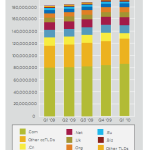There are now almost 200 million domain names registered, and we’ll certainly see the figure hit this milestone later this year. Compared to the first quarter of 2009, domain name registrations grew by 11 million, or 6 percent. Domain registrations seem to beat the economy no matter how its performing.

A decline in .cn (china) registrations has resulted in a shift in the global leader board. The top ranking domain name extenstions for first quarter 2010 are now:
- .com
- .de (Germany)
- .net
- .cn (China)
- .uk (United Kingdom)
- .org
- .info
- .nl (Netherlands)
- .eu (European Union)
- .ru (Russia)
Country code domains (ccTLD) make up around 40% of the total registrations, with 76.3 million ccTLD registrations at the end of 1st quarter 2010.
Big Numbers
Verisign, the registry for .com and .net, handled an average number of DNS queries of 54 BILLION per DAY in the first part of 2010. Peaks were as high as 63.2 billion. The daily average has increased 43% since last year. Taken together with the slower rise in registrations, this suggest more internet users and more internet use by users. These mind-boggling numbers underline how important DNS is to our internet ecosystem. The fees for registering domains are spent many ways, but the most important two are the DNS and the database of who owns what (WHOIS). The registry for .com and .net has maintained 100 percent operation accuracy and stability for the past 12 years, making .com and .net domains amongst the most reliable in the world.
Security
Operational later this year is DNSSEC (Domain Name System Security Extensions). This behind-the-scenes add on to the DNS system will be offered by 2020Media to all its customers automatically as it is rolled out, so all our clients will be offered the ability to upgrade the security and stability of their domains.
About Domain Name Security Extensions (DNSSEC)
DNSSEC ensures that requests to visit an Internet web site reach the intended destination. DNSSEC protects against security vulnerabilities such as DNS cache poisoning, pharming and DNS redirection, commonly exploited to commit fraud and criminal attacks